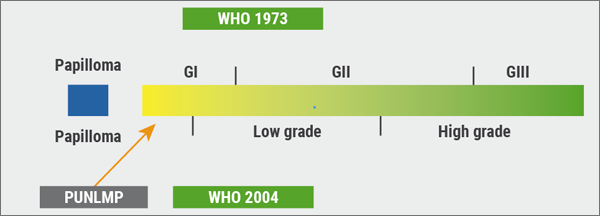Despite the promising therapeutic efficacy of immune checkpoint inhibitors in RCC, response varies significantly between individual patients. Therefore, predictors of response are urgently needed.
The open-label, phase 2 TITAN-RCC trial (NCT02917772) investigates nivolumab monotherapy with additional nivolumab/ipilimumab boost cycles in previously untreated and pre-treated patients with advanced or metastatic RCC with intermediate- and high-risk disease. Participants received nivolumab induction until week 16 and continued with nivolumab maintenance upon remission. Participants who had stable or progressive disease at week 8 received up to 4 cycles of nivolumab plus ipilimumab. Nivolumab maintenance was then continued in these patients. Blood samples for biomarker and phenotype analyses were taken at baseline, during nivolumab induction, and during nivolumab/ipilimumab boost cycles. Dr Marc-Oliver Grimm (University Hospital Jena, Germany) presented the results [1].
TITAN-RCC enrolled 207 patients of whom 137 received the nivolumab/ipilimumab boost. Responders to nivolumab induction were characterised by a higher proportion of activated T cells (expressing 4-1BB or LAG-3) at baseline. Adjusted odds ratios for percentages in responders to nivolumab induction versus non-responders were 1.03 for 4-1BB+CD8+, 1.05 for 4-1BB+CD4+, and 1.0 for LAG-3+CD4+. Moreover, in patients receiving nivolumab plus ipilimumab boosts, a higher proportion of PD-L1+CD14+ monocytes, PD-L1+ early-stage myeloid-derived suppressor cells, and PD-L1+ plasmacytoid dendritic cells were observed in responders versus non-responders. The odds ratios were 1.22, 1.14, and 1.08, respectively.
“In conclusion, this biomarker analysis of TITAN-RCC identified various immune cell-related parameters that are associated with increased therapeutic efficacy in RCC patients,” stated Dr Grimm. “These immune cell parameters may represent novel predictive biomarkers for the response to nivolumab and nivolumab/ipilimumab therapy in clear-cell RCC.”
- Grimm M-O, et al. Novel predictive biomarkers of response to immune checkpoint blockade with nivolumab ± ipilimumab in the TITAN-RCC phase 2 trial. Abstract 367, ASCO GU 2022, 17–19 February.
Copyright ©2022 Medicom Medical Publishers
Posted on
Previous Article
« Combined nivolumab/axitinib treatment elicits good response in metastatic RCC Next Article
DFS benefits with adjuvant pembrolizumab in RCC persist with longer follow-up »
« Combined nivolumab/axitinib treatment elicits good response in metastatic RCC Next Article
DFS benefits with adjuvant pembrolizumab in RCC persist with longer follow-up »
Table of Contents: ASCO GU 2022
Featured articles
Prostate Cancer
First-line treatment with olaparib significantly improves PFS in mCRPC
First-line treatment with niraparib significantly improves PFS in HRR-mutated mCRPC
Darolutamide improves OS in mHSPC
Continued enzalutamide plus docetaxel offers clinical benefit for mCRPC patients who progress on enzalutamide
Radiohybrid PSMA PET imaging has favourable detection rate for prostate cancer recurrence
PSMA PET is a predictive biomarker in mCRPC progressing after docetaxel
Artificial intelligence improves prediction of long-term outcomes
Significant tumour response to neoadjuvant therapy in high-risk non-metastatic prostate cancer
Addition of abiraterone to ADT/docetaxel does not increase bone loss
Bavdegalutamide, a novel androgen receptor degrader, demonstrates clinical activity
Urothelial Carcinoma
No benefit of olaparib in previously untreated, platinum-ineligible, metastatic urothelial carcinoma
Rucaparib maintenance therapy extends PFS in platinum-responsive metastatic urothelial carcinoma
Positive efficacy and safety of N-803 plus BCG infusion in BCG-unresponsive NMIBC
Adding lenvatinib to pembrolizumab does not improve survival in advanced urothelial carcinoma
Maintenance niraparib fails to improve PFS in advanced urothelial cancer
First-line avelumab shows clinical activity in advanced urothelial carcinoma
Favourable pathologic response rate with neoadjuvant chemotherapy in high-risk upper tract urothelial carcinoma
Second-line nivolumab/ipilimumab boost improves ORR in metastatic urothelial carcinoma
Sacituzumab govitecan effective in platinum-refractory metastatic urothelial cancer
Neoadjuvant enfortumab vedotin promising in MIBC ineligible for cisplatin
Renal Cell Carcinoma
High-risk early RCC may benefit from neoadjuvant avelumab plus axitinib
DFS benefits with adjuvant pembrolizumab in RCC persist with longer follow-up
Biomarkers predict response to immune nivolumab (± ipilimumab) in advanced RCC
Combined nivolumab/axitinib treatment elicits good response in metastatic RCC
Folliculin mutations not associated with sporadic chromophobe RCC
Differential patterns of molecular alterations among sites of metastasis in RCC
Nivolumab monotherapy represents an alternative first-line treatment option for treatment-naïve mRCC
Penile & Testicular Cancer
HPV-positive and HPV-negative penile squamous cell carcinoma are molecularly distinct tumours
Atezolizumab does not improve survival in advanced penile cancer
Biomarkers to distinguish necrosis from teratoma before pcRPLND in testicular cancer
Related Articles
May 21, 2019
Office urology


May 21, 2019
Bladder cancer risk and early detection
© 2024 Medicom Medical Publishers. All rights reserved. Terms and Conditions | Privacy Policy

